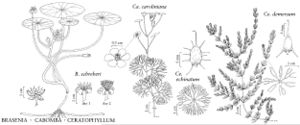Ceratophyllaceae
Herbs perennial, aquatic, without rhizomes; roots absent; air chambers conspicuous. Leaves arising from branched stems, sessile, whorled; stipules absent. Leaf blade undivided to finely dissected, margins serrulate, laticifers absent; 1st leaves of plumule simple or forked. Inflorescences axillary, solitary flowers. Flowers unisexual, staminate and pistillate on same plant, submersed, sessile or nearly so, subtended by involucre of 8-15 linear bracts; perianth absent; stamens 3-50; anthers nearly sessile, dehiscing by longitudinal slits, connective prolonged; pistil 1, simple; ovary 1-locular; placentation laminar; ovule 1; style elongate; stigma decurrent. Fruits achenes, indehiscent. Seed 1, aril absent; endosperm and perisperm absent; embryo well developed; cotyledons 2, fleshy.
Distribution
Worldwide.
Discussion
Genus 1, species 6 (3 species in the flora).
Ceratophyllaceae are water-pollinated.
The extant species of this aquatic family are obviously highly specialized; recent research indicates that Ceratophyllaceae are an ancient lineage. From comparative morphologic data, D. H. Les (1988) hypothesized that Ceratophyllaceae are vestiges of ancient angiosperms that diverged early from the line leading to most other modern taxa. This hypothesis is consistent with recent phylogentic analyses of DNA sequence data (D. H. Les et al. 1991; M. W. Chase et al. 1993; Qiu Y. L. et al. 1993) derived from the chloroplast gene rbcL. The great age of Ceratophyllaceae is indicated by fossil evidence documenting the existence of the family in the Cretaceous Aptian (D. L. Dilcher 1990). The hypothesis that Ceratophyllaceae represent the oldest living angiosperm lineage deserves further scrutiny; meanwhile recent morphologic, molecular, and paleobotanical evidence favors this interpretation over other proposed phylogenetic affinities of the family.
